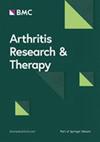比较托珠单抗生物类似物 BAT1806/BIIB800 与托珠单抗参比产品,治疗对甲氨蝶呤反应不佳的中重度类风湿性关节炎患者的 3 期随机、双盲、主动对照临床试验:治疗期 2(第 24 周至第 48 周)分析
IF 4.9
2区 医学
Q1 Medicine
引用次数: 0
摘要
据报道,生物类似药BAT1806/BIIB800和参考药托西珠单抗(TCZ)对中重度类风湿性关节炎(RA)患者的疗效相同,药代动力学、免疫原性和安全性也相当,且均已进行到3期研究的第24周(治疗期[TP]1)。在此,我们将介绍TP2(研究第24-48周)的结果。在这项 3 期、多中心、多区域、双盲、主动对照、等效性研究中,使用甲氨蝶呤治疗活动性 RA 的参与者被随机(1:1:2),静脉注射8 mg/kg TCZ,每4周一次,直至第48周(TCZ组),或TCZ至第24周,然后BAT1806/BIIB800至第48周(TCZ至BAT1806/BIIB800组),或BAT1806/BIIB800至第48周(BAT1806/BIIB800组)。TP2的疗效采用美国风湿病学会(ACR)反应标准(ACR20/50/70)和28个关节疾病活动度评分(DAS28)与基线相比的变化进行评估。此外,还对药代动力学(谷值水平)、安全性和免疫原性进行了评估。在 621 名随机参与者中,577 人(92.9%)完成了 TP1 并进入 TP2(TCZ:145 人 [93.5%];TCZ 至 BAT1806/BIIB800:142 人 [92.2%]):N=142[92.2%];BAT1806/BIIB800:N = 290 [92.9%]).在整个TP2期间,各治疗组的ACR20应答者比例相似(第48周时分别为87.8%、90.3%和90.4%),ACR50和ACR70应答者比例也相似,DAS28也有所下降。各治疗组的药物谷值和抗药抗体发生率相当。各治疗组的不良事件发生率均衡,无死亡事件报告。在TP2中,TCZ组、TCZ至BAT1806/BIIB800组和BAT1806/BIIB800组的疗效、安全性、免疫原性和药代动力学特征相当。NCT03830203和EudraCT 2018-002202-31。本文章由计算机程序翻译,如有差异,请以英文原文为准。
A phase 3, randomized, double-blind, active-controlled clinical trial to compare BAT1806/BIIB800, a tocilizumab biosimilar, with tocilizumab reference product in participants with moderate-to-severe rheumatoid arthritis with inadequate response to methotrexate: treatment period 2 analysis (week 24 to week 48)
Equivalent efficacy and comparable pharmacokinetic, immunogenicity, and safety profiles of the biosimilar BAT1806/BIIB800 and reference tocilizumab (TCZ) in participants with moderate-to-severe rheumatoid arthritis (RA) have been reported up to week 24 (treatment period [TP] 1) of the phase 3 study. Here we present results for TP2 (study weeks 24–48). In this phase 3, multicenter, multiregional, double-blind, active-controlled, equivalence study, participants with active RA despite methotrexate were randomized (1:1:2) to intravenous administration of 8 mg/kg TCZ every 4 weeks to week 48 (TCZ group), or TCZ to week 24 followed by BAT1806/BIIB800 to week 48 (TCZ to BAT1806/BIIB800 group), or BAT1806/BIIB800 to week 48 (BAT1806/BIIB800 group). Efficacy in TP2 was evaluated using American College of Rheumatology (ACR) response criteria (ACR20/50/70) and change from baseline in Disease Activity Score on 28 joints (DAS28). Pharmacokinetics (trough levels), safety, and immunogenicity were also evaluated. Of 621 randomized participants, 577 (92.9%) completed TP1 and entered TP2 (TCZ: N = 145 [93.5%]; TCZ to BAT1806/BIIB800: N = 142 [92.2%]; BAT1806/BIIB800: N = 290 [92.9%]). Proportions of ACR20 responders were similar between treatment groups throughout TP2 (87.8%, 90.3%, and 90.4%, respectively, at week 48), as were proportions of ACR50 and ACR70 responders, and reduction in DAS28. Drug trough levels and antidrug antibody incidences were comparable between the treatment groups. Adverse events were balanced across the treatment groups and no fatal events were reported. In TP2, efficacy, safety, immunogenicity, and pharmacokinetic profiles were comparable between the TCZ, TCZ to BAT1806/BIIB800, and BAT1806/BIIB800 groups. NCT03830203 and EudraCT 2018-002202-31.
求助全文
通过发布文献求助,成功后即可免费获取论文全文。
去求助
来源期刊

Arthritis Research & Therapy
RHEUMATOLOGY-
CiteScore
8.60
自引率
2.00%
发文量
261
审稿时长
14 weeks
期刊介绍:
Established in 1999, Arthritis Research and Therapy is an international, open access, peer-reviewed journal, publishing original articles in the area of musculoskeletal research and therapy as well as, reviews, commentaries and reports. A major focus of the journal is on the immunologic processes leading to inflammation, damage and repair as they relate to autoimmune rheumatic and musculoskeletal conditions, and which inform the translation of this knowledge into advances in clinical care. Original basic, translational and clinical research is considered for publication along with results of early and late phase therapeutic trials, especially as they pertain to the underpinning science that informs clinical observations in interventional studies.
 求助内容:
求助内容: 应助结果提醒方式:
应助结果提醒方式:


